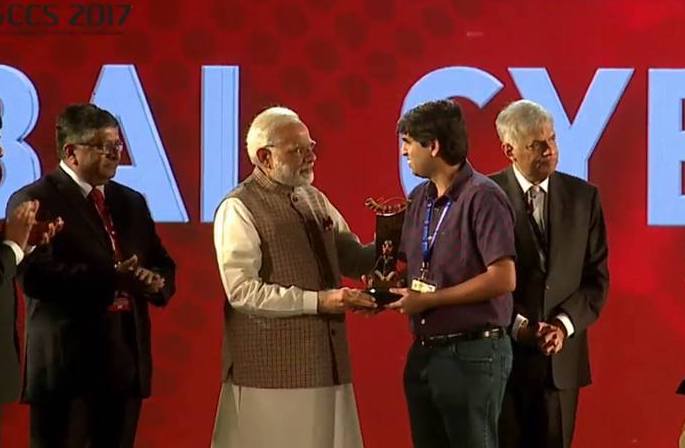
As cybersecurity emerges as a significant differential for economic progress across the globe, an open dialog between cybersecurity experts and governments becomes critical in influencing the global community and ensuring a safe cyberspace for the world economy.
A team of Aggies researching these cybersecurity issues has won the Global Cyber Challenge Peace-a-thon at the 2017 Global Conference on Cyber Space (GCCS), which was inaugurated by the Indian prime minister, Narendra Modi, in New Delhi, India.
Bharadwaj Satchidanandan, a graduate student in the Department of Electrical and Computer Engineering at Texas A&M University, is the team lead for “Aggies” – the Texas A&M team that emerged as the winner of Best International Team award at the hackathon challenge. Satchidanandan’s team included his research advisor, Dr. P.R. Kumar, College of Engineering Chair in Computer Engineering and Distinguished Professor in the electrical and computer engineering department.
“Cyberspace remains a key area for innovation,” said Modi in a speech at the conference. “Nations must take responsibility to ensure that the digital space does not become a playground for the dark forces of terrorism and radicalization. Information sharing and coordination among security agencies is essential to counter the ever-changing threat landscape.”
Finalists for the challenge consisted 15 teams from India, Canada, United States, France and Argentina.
The hackathon began with 14 problem statements in the area of cybersecurity and privacy. The teams had 36 hours to present their solution to the problem statements and develop a proof of concept demonstrating their solution, and Satchidanandan presented Texas A&M Engineering’s video on his research with Kumar. A jury selected the winners based on a pre-decided evaluation framework. Modi presented the winners with their awards after the event.
Delegates and officials representing more than 120 countries attended the GCCS event, which was launched in 2011 to establish the internationally agreed “rules of the road” for behavior in cyberspace.
“We as a society are becoming more and more reliant on the cyberspace,” said Satchidanandan when asked about his biggest takeaway from the event and what he would like the local community to know about the cybersecurity issues he is studying. “The technical community, policy makers and law enforcement agencies are hard at work behind the scenes to ensure that the privacy and security of each individual is ensured in the digital domain.”